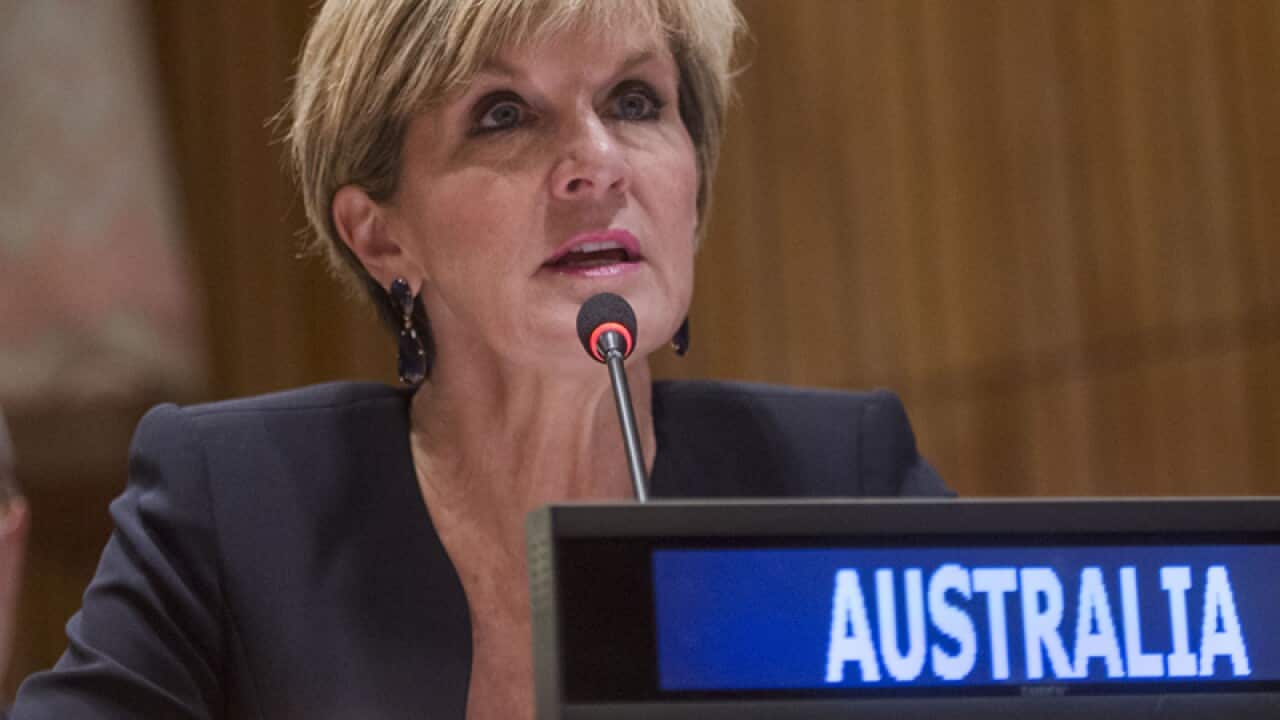The future of Syria, Iraq and Ukraine will be high on the agenda as Foreign Minister Julie Bishop attends the UN General Assembly in New York.
The assembly will kick off with duelling speeches between US President Barack Obama, due around 11pm AEST on Monday, and Russia's Vladimir Putin.
Ahead of the speeches, US Secretary of State John Kerry and other senior political figures gathered over breakfast to discuss Syria.
Ms Bishop will attend a lunch hosted by the UN Secretary General Ban Ki-moon, and catch up with President Obama at a leaders' summit on peacekeeping which she will address.
She will later attend an evening reception hosted by Mr Obama.
In his opening speech the US leader is expected to outline America's renewed effort to fight Islamic State, or Daesh, and tackle violent extremism.
He will make a case for stronger partnerships with countries including Australia and Syria's neighbours to confront security challenges and deal with the growing humanitarian crisis.
Much attention will be on a bilateral meeting between Mr Obama and Mr Putin, where the US leader will seek progress on resolving conflict in Syria and the Ukraine.
Mr Putin is taking his own approach to Syria, building an intelligence-sharing coalition involving Iraq, Iran and Syria.
The US has been focused on its coalition of mainly Sunni Arab and Western countries, such as Australia, to fight the Islamic State group in Iraq and Syria.
Washington has demanded that Syrian leader Bashar al-Assad step down, but Mr Putin's rival alliance with Shi'ite-led states will instead shore up the beleaguered government in Damascus.
Ms Bishop told AAP Russian Foreign Minister Sergey Lavrov had made it clear his country shared Australia's commitment to defeating Daesh.
Australia recognised - along with other countries such as the US - that the military option "is not the whole solution", she said.
"There needs to be a political outcome in Damascus - all options should remain on the table," she said.
However Ms Bishop said Mr Lavrov had told her Russia had a particular view about the stability of the Assad regime being vital to peace.
"And if you leave a vacuum it could be filled by something worse," she said of the Russian minister's view.
It's expected there will be announcements at the peacekeeping summit on new US commitments in the areas of aviation, infantry, police and transport and other mission support.
Of the 120,000 UN peacekeepers currently deployed around the world, 48 Australian police and troops are serving in the Middle East, South Sudan and Afghanistan.
In a formal statement issued after the meeting with US Secretary of State John Kerry, the global coalition to counter Daesh said progress was being made to defeat the terrorists.
"We have a great deal more work to do together," the statement said.
"The world is united in its rejection of Daesh and its debased ideology."
A report was presented on progress in Syria and Iraq.
Syrian opposition forces as well as Iraqi security forces, Kurdish Peshmerga and popular mobilisation forces had been central to the effort against Daesh.
Daesh could no longer operate freely in about a third of the Iraq territory it had previously held, the meeting heard.
In northern Syria, Daesh had lost much of the territory it had seized, and is now cut off from all but about 100 of the 822km border between Syria and Turkey.
More than 5000 coalition trainers and advisors from 18 countries are in Iraq supporting the Iraqi governments efforts to strengthen and develop local security forces.
And more than 900 coalition personnel are assisting the train and equip mission for the Syrian opposition.
The statement said the coalition supported the Syrian people to confront ISIL and to establish a transitional government based on the principles of the Geneva Communique, leading to a democratic, inclusive, and pluralistic government that represents the will of all the Syrian people.
Share

